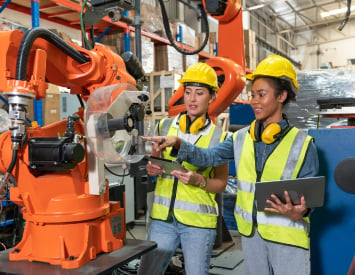In the fast-paced and demanding world of engineering, the significance of prioritizing the well-being of engineers in the workplace cannot be overstated.
Engineers are the architects of progress, and their mental and physical health directly influences the quality of their work, creativity, and overall job satisfaction.
Fostering employee well-being is good for people and the organization. Promoting well-being can help prevent stress and create positive working environments where individuals and organizations can thrive.
Good health and well-being can be a core enabler of employee engagement and organizational performance.
This article will look at the benefits of well-being in the workplace and how this can be achieved.
Why Is Well-Being in the Workplace Important?

Lately, well-being in the workplace has been coming into the limelight more and more, and for good reason!
A few years ago, many people were under the impression that wellness was purely physical, but we know now that a healthy mind is equally crucial to the happiness of employees. But even though it’s being discussed more than ever, many organizations are still a long way off where they need to be when it comes to supporting their staff’s mental health.
Promoting well-being in the workplace is all about providing your staff with the necessary incentives, tools, and support to help them bring their best to the job.
Assisting staff to professionally develop and engage with each other during non-work-related events can increase productivity by reminding them that they’re appreciated, and that the 40+ hours they’re putting in every week matter.
This pertains to engineers across diverse fields, including electrical, mechanical, civil, and electronic engineering.
The Benefits of Well-Being in the Workplace
Ensuring well-being in the workplace poses a persistent challenge for many organizations due to a myriad of factors.
These include the complex interplay of individual needs, evolving work environments, varying organizational cultures, and the ongoing need for adapting strategies to address emerging well-being concerns.
The multifaceted nature of employee well-being, encompassing physical and mental health, work-life balance, and job satisfaction, adds layers of complexity to the endeavor. Additionally, the ever-changing landscape of workplace expectations and societal shifts necessitates a continuous and dynamic approach to well-being initiatives, making it a prolonged and intricate task for organizations.
Although it may be challenging, it is not impossible. Let us look at some of the benefits of ensuring employee well-being in the workplace.
Mental Well-being Unleashes Innovation
A workplace that promotes mental well-being provides fertile ground where innovation can flourish.
Engineers, often tasked with solving complex problems and pushing the boundaries of technology, require a clear and focused mind. Stress and burnout can stifle creativity and impede the ability to think critically.
Companies that prioritize mental health initiatives foster an environment where engineers feel supported, leading to breakthrough ideas and solutions.
Productivity and Performance Soar
Well-being is not just a personal concern; it’s a business imperative. When engineers feel physically and mentally well, their productivity and performance skyrocket.
A healthy work environment, with ergonomic considerations and a focus on stress reduction, ensures that engineers can fully engage in their tasks without the hindrance of discomfort or fatigue. This, in turn, leads to more efficient and effective project outcomes.
Retention and Recruitment Advantages
A commitment to the well-being of engineers is a powerful tool for talent retention and recruitment.
Engineers are in high demand, and organizations that prioritize employee health and wellness create a magnetic workplace culture.
Job satisfaction increases, reducing turnover rates, while potential hires are drawn to companies that demonstrate a genuine concern for their employees’ well-being.
Enhanced Team Dynamics
Engineering projects are often collaborative endeavors, requiring effective teamwork and communication.
A workplace that prioritizes well-being fosters positive team dynamics. When individuals feel supported and valued, they are more likely to collaborate openly, share ideas, and contribute to a positive team culture. This collaborative spirit enhances the overall success of engineering projects.
Physical Well-being Matters
The physical demands of engineering, whether in a lab, on a construction site, or in an office, necessitate attention to physical well-being.
Adequate safety measures, ergonomic workspaces, and health-promoting initiatives not only prevent workplace injuries but also contribute to the overall health and longevity of engineers’ careers.
Work-Life Balance
Engineering projects often involve tight deadlines and intense focus.
However, a sustainable work-life balance is essential for long-term success. Companies that recognize the importance of downtime and offer flexible work arrangements cultivate a culture that values both professional and personal aspects of an engineer’s life, resulting in a more content and engaged workforce.
Encouraging regular breaks and fostering an environment that prioritizes employee well-being not only enhances creativity and problem-solving skills but also contributes to overall job satisfaction and retention.

How Can This Be Achieved?
Ensuring well-being in the workplace for engineers involves a holistic approach that addresses various aspects of their professional and personal lives.
Here are key strategies that companies can implement to foster well-being among their engineering teams:
Promote Work-Life Balance: Encourage a healthy balance between work and personal life by setting realistic expectations for workload and deadlines. Implement flexible work schedules or remote work options when feasible.
Provide Mental Health Support: Offer access to mental health resources, such as counseling services or employee assistance programs. Normalize discussions around mental health and create a stigma-free environment.
Training and Skill Development: Invest in professional development opportunities that enhance engineers’ skills and knowledge. This not only boosts their confidence but also contributes to a sense of accomplishment and well-being.
Create a Positive Work Environment: Foster a positive and inclusive workplace culture where engineers feel valued, respected, and supported. Recognize and celebrate achievements and encourage open communication among team members.
Health and Wellness Programs: Implement wellness initiatives, such as fitness programs, health screenings, or mindfulness activities. These programs contribute to physical well-being and can enhance team cohesion.
Clear Communication: Provide transparent communication about company policies, expectations, and changes. Keep engineers informed about organizational decisions that may impact their work or well-being.
Encourage Social Connection: Facilitate opportunities for social interactions among team members. This can include team-building activities, social events, or even casual discussions to strengthen interpersonal connections.
Recognition and Rewards: Acknowledge and reward engineers for their contributions and achievements. Feeling recognized and appreciated contributes to job satisfaction and overall well-being.
Monitor Workload: Keep a watchful eye on workload distribution to prevent burnout. Distribute tasks evenly, consider team capacity, and provide additional support during peak periods.
A Well-Being-Centric Future for Engineering
In engineering, where the pursuit of excellence is relentless, prioritizing the well-being of engineers is not just a compassionate choice—it’s a strategic one. A workplace that prioritizes mental and physical health becomes the incubator for innovation, collaboration, and sustained high performance.
Engineering brilliance flourishes in an environment where individuals feel valued, supported, and able to balance the demands of work and life.
As the discussion on workplace well-being evolves, it is essential to underscore the significance of individual determination and resilience in this journey. Recognizing that well-being is a collaborative effort, companies must empower their engineers to take an active role in their own health and happiness. Self-determination becomes a key driver as engineers navigate the intricate demands of their profession, encouraging them to proactively engage in practices that enhance their mental and physical well-being.
Embracing resilience, individuals can weather the challenges of the fast-paced engineering world, emerging stronger and more equipped to contribute meaningfully to their work and teams. In the well-being-centric future of engineering, fostering an environment that not only supports but also champions the individual’s commitment to self-care will be integral to achieving enduring success and vitality in the field.
By recognizing the importance of self-determination and resilience, both organizations and engineers pave the way for a future where well-being is not just a workplace initiative but a personal triumph, contributing to the thriving ecosystem of the entire engineering discipline.
As the engineering landscape evolves, companies that champion the well-being of their engineers are not just investing in individuals; they are investing in the enduring success and vitality of the entire engineering discipline.
References


